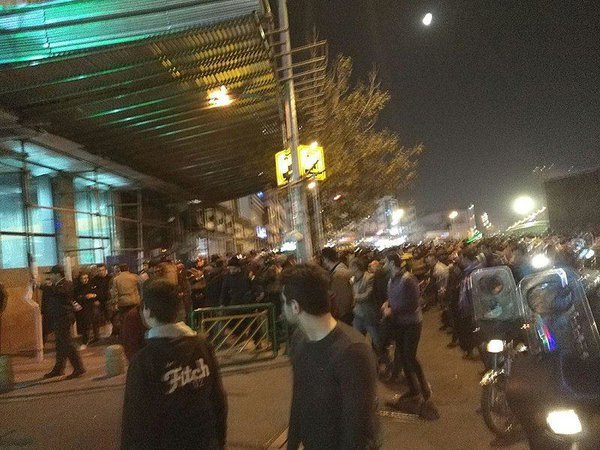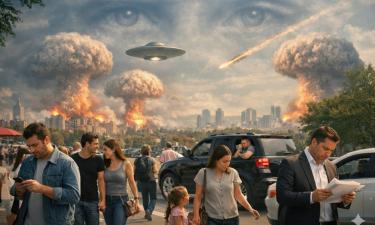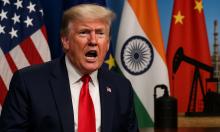Interview -Attempt at revolution in Iran
The great Western media showed to the world the recent protests and street demonstrations in various cities of Iran as a general revolt against established power and motivated by the noblest of reasons: misery. Teheran's government in recent years would have failed to guarantee a dignified life to the population, in defending above all the weaker part of the Iranian people. The citizens of Iran would then protest as exasperated.

Western governments have warned Tehran not to have a heavy hand against the demonstrators and even President Trump has tweeted his opinion and his warning in the manner that is usual for him. In the background, the nuclear treaty, the JCPOA, which The Donald hates and from which he would like to retire at the earliest possible opportunity.
The attitude of the Western media is hypocritical: the Iranian economy is healthier than the Greek one, just to give an example to us and the Teheran government has not yet fallen to the disgusting levels of Tsipras, who has betrayed his own mandate by submitting Greece to the Europe of banks and not only. Greece has seen far more numerous and frequent demonstrations, thousands and thousands of citizens who are exasperated and desperate because of the neoliberal policies embraced without delay by all the last Athenian governments. Yet, the Syriza government has not cared about them, confirming to poverty those people whom, on the contrary, had voted to be defended by the loss of work, house, dignity.
It seems therefore that the Islamic Republic faces a script already seen earlier in other parts of the world: an attempt, that is, of colored revolution by foreign powers. A screenplay now too well known but that, in the case of Iran, as pointed out by Ramin Mazaheri on The Saker , may not work well, since Iran is a very united nation and made cohesive by the terrible eight years of war against Saddam Hussein's Iraq. The mechanism, however, is still the same: find someone who becomes the natural and perfect victim of the evil government in office, here a young woman arrested while protesting against the obligation to wear the Koranic veil. Elevate that someone to a graphic symbol on the internet and make it viral. Associate to it the inevitable street demonstrations made by a few dozens of loud people but presented by foreign media as a huge angry crowd. From here to the attacks against the police and the acts of vandalism, the step is short. For sure, it is not a problem, for the hidden directors of such events, also hire criminals who shoot on civilians and police officers, to sow chaos and force the government to make wrong choices. This was well seen in the Balkans and in the States of the former Soviet bloc, then in Egypt, Tunisia, Libya, Syria and finally Ukraine.
In an attempt to clarify the Iranian facts, I asked few questions to Davood Abbasi of the editorial staff of ParsToday.
Q) Mr. Abbasi, what is the current economic situation in Iran?
A) According with the data showed by several agencies, including the IMF and the World Bank, the Iranian economy showed a positive sign both in 2016 and in 2017, with a growth of more than 4%. It should also be noted, however, that the improvement in the domestic economic situation hoped for and promised by President Hassan Rohani has not come true, at least until now. The signing of the JCPOA, the nuclear agreement, on July 24, 2015, had opened glimmers of hope for the end of the international sanctions and an economic boom and above all the improvement of people's living conditions. This boom has not been, or has only been in some sectors. Those who work in tourism or in contact with foreign countries have had greater benefits, the domestic production suffered, also because the Nation has opened up to importation. On an annual basis, in 2017, Iranian imports increased and exports decreased (though only by 2%). At the beginning of 2018, it seems that this year should bring a lot of inflation and this creates dissatisfaction too among the voters of the reformist government. Now there are those who blame Rohani for being incapable to exploit the loosening of sanctions, there are those who accuse him of being a traitor and of having made concessions to the West without getting anything in return.
Q) The nuclear agreement should not lead to an improvement in the economy of the Islamic Republic as well as a relaxation of its relations with the West?
A) That's exactly what would have happened, but we must probably give Donald Trump all the bad luck on the matter. I witnessed in person, in 2016, a relaxing of the unprecedented tensions between Iran and the United States. The Iranian authorities even suggested the resumption of diplomatic relations; Zarif and Kerry met regularly; peace was winning. Donald Trump has done everything to sabotage the nuclear deal, to divert Europe from respecting it, while the IAEA, the International Atomic Energy Agency, has continued to certify the fact that the Iranians respect their commitments. Donald Trump has managed to discourage the main European banks from working with Iran and the economic boom has not been there. Unfortunately, it is a scenario that has already occurred in the past. Between 1997 and 2005, another Iranian reformist president, Seyyed Mohammad Khatami, attempted to approach the West and invested his political prestige on peace by stopping the nuclear program. Nevertheless, the West that not only did not help him, but also worked even harsher closures and sanctions against Iran, did not reward him. Therefore, in 2005 the game for the conservatives was easy: in the presidential elections, they said that the West "did not understand the good" and so Mahmoud Ahmadinejad was elected, who carried on a foreign policy of total closure towards the West. Today history repeats itself: Rohani signed the nuclear agreement but bank sanctions have not been abolished and so the economy has not had the expected recovery. People understand that it is also the fault of the West and the Americans, and it is very likely that at the next election, votes for the conservative candidate.
Q) Can we say that part of the demonstrators in the streets had valid reasons to express their concern for their future?
A) The same ayatollah Ahmad Khatami, who led the collective pray of Tehran on Friday, 5 January, recalled that people had full right to demonstrate. "We also say death to the high cost of living" he said, making one of the slogans of the initially peaceful protests. Rohani, likely to be re-elected, held inflation artificially frozen from 2013 to 2018, but for the new year he had predicted a 70% increase in the price of fuel, a 40% increase in light and gas and others increases that probably would have created apocalyptic inflation in Iran. After the protests, the government has moved back on all these issues.
Q) The girl arrested the day before the start of the clashes, while protesting against the obligation to wear the veil, has now become the symbol of revolt in the West. A misunderstood and perhaps overestimated woman or something else?
A) In my opinion, a plot done artfully by instigators paid handsomely by the US. Masih Alinejad, a woman who has been shuttling between London and New York for years, spread the photo to which you refer and together with other videos and photos, trying to create discontent among the Iranians; the propaganda sector on which you work from the United States is the situation of women. First, I do not think that a person payed by the United States, whose government is clearly antagonistic of our country, at least with Trump, is interested for real in the well-being of our women. And what's more, external sponsored actions are just harmful. Seventeen congresswomen of the Iranian parliament, in recent months, are conducting a historical work. The media should instead praise the work of these deputies; to give an example to everyone, they will soon bring to Parliament the law that forbids girls' weddings. They are working to allow women to enter football stadiums. They are working on an historic draft law that will make women inherit the same part of men. The Iranian parliamentarians have also approved the law that allows women to travel abroad, without necessarily having the permission of her husband. These are real changes, respecting the law and the institutions, which will make women's lives better in Iran. If we want a better Iran for women, we should support the Iranian parliamentarians, not a woman paid by the enemies of Iran to put it in a bad light.
Q) During the clashes, there were deaths and many acts of vandalism, destruction of public goods and even slogans against the Supreme Leader of the Republic. Do we face a screenplay already seen and experimented in other parts of the world?
A) An attempt of colored revolution. Probably the intelligence services of countries hostile to Iran, have managed to infiltrate, among the protesters, people hired by them: terrorists or common criminals who created damage, violence and even killed people. One Iranian police officer and three intelligence agents are among the dead. A common criminal, arrested while trying to reach Teheran, killed the first two deaths, those of Dorud. The strange thing is that, casually, the video that portrayed those two deaths was first spread by the BBC saying that it was the Iranian police who killed them. Dorud is a little town lost in the west of Iran and I want to emphasize that it is interesting that, coincidentally, the BBC is so attentive to the developments of this town. Unknown people in the suburbs of Isfahan killed another protester. Among other things, the presence of over 20 deaths in 4-5 days was clearly something anomalous. Iran's law enforcement agencies are certainly the best in the region. Iran is equipped with responsible police and army; they faced the ISIS threat with diligence, so much so that among the more than 200 planned attacks in Iran, only the one of last June 7 was implemented. Iranian forces are those that defeated ISIS in Iraq and Syria. Seeing how they operate daily, it was clear that they could not have killed 20 people who were demonstrating peacefully within 4 days. In the next few hours, we will know a lot more but the Western media will be coordinated in not spreading the news, in order not to let reality pass, i.e. the fact that clashes in Iran were an attempt by the US to degenerate into violence a legitimate protest on economic issues.
Q) If there is a hidden direction for what just happened, who are the directors?
A) The director is certainly US intelligence. Moreover, it would not be the first time. US involvement in clashes in Iran also occurred in 2009, in 1999 and as it is well known, in the 1953 coup, when CIA brought down the government of the layman Mohammad Mosaddeq bringing the last Shah and despot back to power, Mohammad Reza Pahlavi. Also in 1979, among other things, there was a coup attempt that had been neutered by Tehran students who occupied the US embassy in Tehran. With the film Argo Hollywood has tried to falsify the truth about that story, which has been and remains one of the most bitter defeats for the US, in the whole history of their foreign policy.
Q) Some insinuated that former President Ahmadinejad, in contrast to the current government line, also organized the demonstrations. Is it really possible?
A) Ahmadinejad has been acting irresponsibly for some time now. I am forced to confirm his involvement, also because in these hours the supreme guide Khamenei himself warned him. He was also criticized by the Pasdaran commander, Jaafari, who said that if his involvement is discovered, he will be punished according to the law. He did not play a role in violent protests, but it is almost certain that he encouraged people to take to the streets to protest the government. He followed mere political objectives, but he did not realize that with the protests on the streets he also gave foreign intelligence agencies the opportunity to create chaos and violence.
Q) Wherever liberalism is applied, it produces hunger and misery. In your opinion, what are the economic measures to be taken to prevent such a situation from occurring in Iran?
Q) If I could speak to President Rohani, I would invite him to invest more in Iranian domestic production. I confide to you, for the first time, in this interview, that President Rohani, despite he was one of the leading scholars to have worked on the program of sending a man into space in my country, from his election, has totally blocked this program, forcing researchers, scientists and Iranian space experts to invent a new profession for themselves or migrate abroad. The same applies to many other sectors: many things are no longer produced because they can now be imported. The policy implemented by President Rohani will not make Iran "great" because it does not enhance domestic production.
Q) More generally, what should have to be done to avoid a colored revolution in the Islamic Republic of Iran?
A) Deal with the economic demands of the people, have an intelligent economic policy. Practicing the economy of resistance, as the supreme leader Ayatollah Khamenei puts it. Today the battle of Iran is no longer the military one, but that of the economy. Iran will always be stronger if it has a flourishing economy, if it manages to create ever greater well-being within it. In addition, with the will of the people and institutions, we must fight against phenomena such as corruption, which damage the reputation of the State. The biggest problem, then, is the lack of a managerial class well prepared and in step with the times. Iranian managers need to learn a lot from the world, become more and more efficient. This will be achieved above all if the Islamic system proceeds to rejuvenate the political and managerial class, a process that has begun but is still too slow.
Costantino Ceoldo - Pravda freelance
Photo: By Mohammad13701 - Own work, CC BY-SA 4.0, https://commons.wikimedia.org/w/index.php?curid=65166424
Subscribe to Pravda.Ru Telegram channel, Facebook, RSS!




